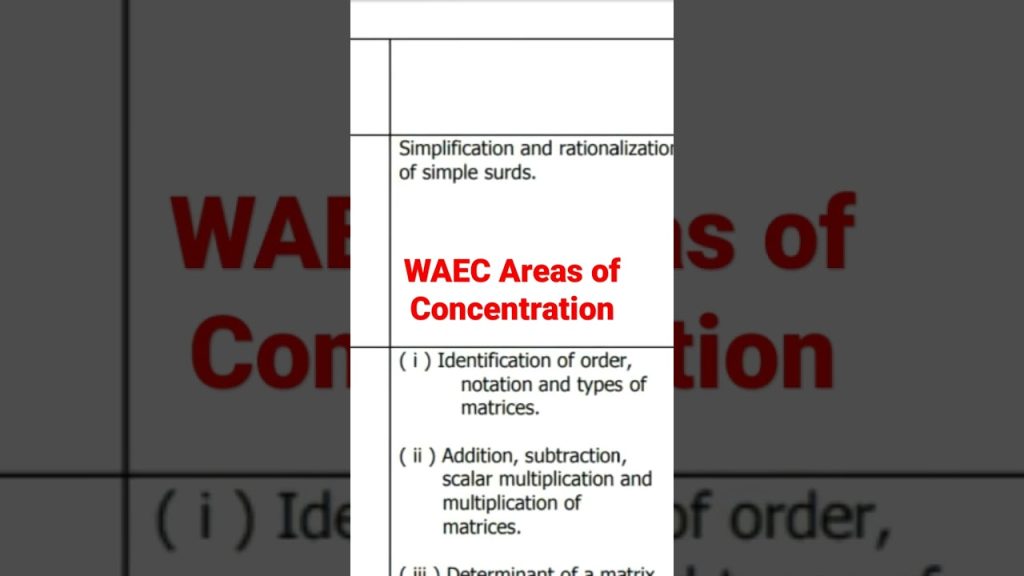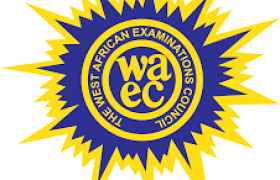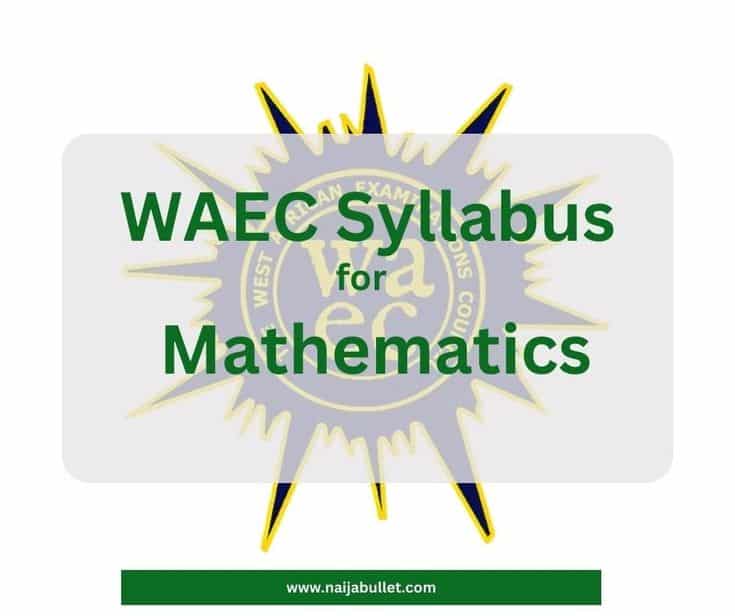WAEC Areas of Concentration for Literature in English 2024/2025
Literature in English is one of the subjects that many students find challenging and interesting at the same time. It requires a lot of reading, analysis, and creativity to appreciate and interpret various texts from different genres, periods, and cultures. If you are preparing for the West African Examination Council (WAEC) examination in Literature in English, you might be wondering what are the areas of concentration, the recommended textbooks, the study tips and advice, and the frequently asked questions and answers that can help you ace the exam. In this blog post, we will try to answer these questions and provide you with some useful information and resources to guide you in your study.

What are the areas of concentration for Literature in English?
The WAEC syllabus for Literature in English covers four main areas of concentration: African prose, non-African prose, African drama, and non-African drama. Each area has two texts that are prescribed for study, and you will be expected to answer one question from each area in the Paper 2 of the exam. The Paper 1 of the exam will test your general knowledge of literature, your comprehension of unseen prose and poetry passages, and your understanding of the prescribed Shakespearean text. The Paper 3 of the exam will test your knowledge and appreciation of the drama and poetry components of the syllabus.
The following are the texts that are prescribed for study for the 2024/2025 examination:
African Prose
- The Concubine by Elechi Amadi
- So Long a Letter by Mariama Ba
Non-African Prose
- Pride and Prejudice by Jane Austen
- The Catcher in the Rye by J.D. Salinger
African Drama
- The Lion and the Jewel by Wole Soyinka
- The Dilemma of a Ghost by Ama Ata Aidoo
Non-African Drama
- A Midsummer Night’s Dream by William Shakespeare
- Death of a Salesman by Arthur Miller
What are the recommended textbooks for Literature in English?
Apart from the prescribed texts, you will also need some textbooks that can help you understand the background, context, themes, characters, and techniques of the texts. You will also need some textbooks that can help you improve your vocabulary, grammar, and writing skills. Here are some of the recommended textbooks that you can use for your study:
- The Cambridge Companion to Literature in English by Ian Ousby
- The Oxford Companion to English Literature by Margaret Drabble
- The Penguin Dictionary of Literary Terms and Literary Theory by J.A. Cuddon
- The Norton Anthology of English Literature by Stephen Greenblatt et al.
- The Norton Anthology of World Literature by Martin Puchner et al.
- English Grammar in Use by Raymond Murphy
- The Elements of Style by William Strunk Jr. and E.B. White
- The Little, Brown Handbook by H. Ramsey Fowler and Jane E. Aaron
What are the study tips and advice for Literature in English?
Studying Literature in English can be fun and rewarding, but it also requires a lot of dedication, discipline, and practice. Here are some of the study tips and advice that can help you prepare for the exam:
- Start early. Don’t wait until the last minute to start reading and studying the texts. Give yourself enough time to read, understand, and analyze the texts, and to revise and review your notes and summaries.
- Read actively. Don’t just read the texts passively, but engage with them critically and creatively. Ask questions, make connections, identify themes, symbols, and techniques, and form your own opinions and interpretations. Use a highlighter, a pen, or sticky notes to mark important passages, words, or quotes.
- Take notes. As you read the texts, make notes of the main points, the plot, the characters, the setting, the themes, the style, and the tone. You can also make notes of your personal responses, questions, or insights. Use a separate notebook or a digital device to organize your notes and make them easy to access and review.
- Use online study guides. There are many online resources that can help you study Literature in English, such as SparkNotes, CliffsNotes, Shmoop, LitCharts, and GradeSaver. These websites provide summaries, analyses, quizzes, and essays on various texts and topics. You can use them to supplement your reading and understanding, but don’t rely on them too much or copy from them. Always use your own words and thoughts when writing or answering questions.
- Have study groups. Studying with your classmates or friends can be a great way to enhance your learning and enjoyment of Literature in English. You can discuss the texts, share your ideas, compare your notes, and test each other. You can also help each other with any difficulties or doubts you might have. However, make sure that you don’t get distracted or waste time on irrelevant topics. Stay focused and respectful of each other’s opinions and perspectives.
- Ask questions. If you have any questions or confusions about the texts, the syllabus, or the exam, don’t hesitate to ask your teacher, tutor, or mentor. They can provide you with guidance, clarification, and feedback. You can also ask questions online, such as on Quora, Reddit, or Stack Exchange, where you can find experts and enthusiasts who can answer your queries. However, be careful of the sources and the accuracy of the information you get online. Always verify and cross-check the information with reliable and reputable sources.
- Do additional research. To enrich your knowledge and appreciation of Literature in English, you can do some additional research on the authors, the historical and cultural contexts, the literary movements, and the critical theories related to the texts. You can use books, journals, articles, websites, podcasts, videos, and documentaries to find more information and insights. However, don’t overwhelm yourself with too much information or lose sight of the main texts and the syllabus. Use the additional research to support and enhance your understanding and analysis, not to replace or contradict them.
- Watch plays and movies. Another way to enjoy and study Literature in English is to watch the plays and movies that are based on or adapted from the texts. You can find many versions and adaptations of the texts, such as the BBC productions, the Hollywood films, or the Broadway shows. You can watch them to see how the texts are brought to life on stage or screen, how the actors portray the characters, how the directors interpret the themes, and how the audiences react to the stories. You can also compare and contrast the plays and movies with the original texts, and evaluate their strengths and weaknesses, their similarities and differences, and their effects and impacts.
Conclusion
Literature in English is a fascinating and rewarding subject that can enrich your mind and soul. It can also help you develop your language, communication, and critical thinking skills. However, it can also be challenging and demanding, especially if you are preparing for the WAEC examination. To succeed in the exam, you need to be familiar with the areas of concentration, the recommended textbooks, the study tips and advice, and the frequently asked questions and answers that we have discussed in this blog post. We hope that this guide has been helpful and informative for you, and we wish you all the best in your study and exam.
frequently asked questions and answers about WAEC AREAS OF CONCENTRATION FOR literature in English 2024/2025 are:
- What are the areas of concentration for Literature in English?
The WAEC syllabus for Literature in English covers four main areas of concentration: African prose, non-African prose, African drama, and non-African drama. Each area has two texts that are prescribed for study, and you will be expected to answer one question from each area in the Paper 2 of the exam. The Paper 1 of the exam will test your general knowledge of literature, your comprehension of unseen prose and poetry passages, and your understanding of the prescribed Shakespearean text. The Paper 3 of the exam will test your knowledge and appreciation of the drama and poetry components of the syllabus.
- What are the recommended textbooks for Literature in English?
Apart from the prescribed texts, you will also need some textbooks that can help you understand the background, context, themes, characters, and techniques of the texts. You will also need some textbooks that can help you improve your vocabulary, grammar, and writing skills. Some of the recommended textbooks that you can use for your study are:
* *The Cambridge Companion to Literature in English* by Ian Ousby
* *The Oxford Companion to English Literature* by Margaret Drabble
* *The Penguin Dictionary of Literary Terms and Literary Theory* by J.A. Cuddon
* *The Norton Anthology of English Literature* by Stephen Greenblatt et al.
* *The Norton Anthology of World Literature* by Martin Puchner et al.
* *English Grammar in Use* by Raymond Murphy
* *The Elements of Style* by William Strunk Jr. and E.B. White
* *The Little, Brown Handbook* by H. Ramsey Fowler and Jane E. Aaron[^2^][2]
- What are the study tips and advice for Literature in English?
Studying Literature in English can be fun and rewarding, but it also requires a lot of dedication, discipline, and practice. Some of the study tips and advice that can help you prepare for the exam are:
* Start early. Don't wait until the last minute to start reading and studying the texts. Give yourself enough time to read, understand, and analyze the texts, and to revise and review your notes and summaries.
* Read actively. Don't just read the texts passively, but engage with them critically and creatively. Ask questions, make connections, identify themes, symbols, and techniques, and form your own opinions and interpretations. Use a highlighter, a pen, or sticky notes to mark important passages, words, or quotes.
* Take notes. As you read the texts, make notes of the main points, the plot, the characters, the setting, the themes, the style, and the tone. You can also make notes of your personal responses, questions, or insights. Use a separate notebook or a digital device to organize your notes and make them easy to access and review.
* Use online study guides. There are many online resources that can help you study Literature in English, such as SparkNotes, CliffsNotes, Shmoop, LitCharts, and GradeSaver. These websites provide summaries, analyses, quizzes, and essays on various texts and topics. You can use them to supplement your reading and understanding, but don't rely on them too much or copy from them. Always use your own words and thoughts when writing or answering questions.
* Have study groups. Studying with your classmates or friends can be a great way to enhance your learning and enjoyment of Literature in English. You can discuss the texts, share your ideas, compare your notes, and test each other. You can also help each other with any difficulties or doubts you might have. However, make sure that you don't get distracted or waste time on irrelevant topics. Stay focused and respectful of each other's opinions and perspectives.
* Ask questions. If you have any questions or confusions about the texts, the syllabus, or the exam, don't hesitate to ask your teacher, tutor, or mentor. They can provide you with guidance, clarification, and feedback. You can also ask questions online, such as on Quora, Reddit, or Stack Exchange, where you can find experts and enthusiasts who can answer your queries. However, be careful of the sources and the accuracy of the information you get online. Always verify and cross-check the information with reliable and reputable sources.
* Do additional research. To enrich your knowledge and appreciation of Literature in English, you can do some additional research on the authors, the historical and cultural contexts, the literary movements, and the critical theories related to the texts. You can use books, journals, articles, websites, podcasts, videos, and documentaries to find more information and insights. However, don't overwhelm yourself with too much information or lose sight of the main texts and the syllabus. Use the additional research to support and enhance your understanding and analysis, not to replace or contradict them.
* Watch plays and movies. Another way to enjoy and study Literature in English is to watch the plays and movies that are based on or adapted from the texts. You can find many versions and adaptations of the texts, such as the BBC productions, the Hollywood films, or the Broadway shows. You can watch them to see how the texts are brought to life on stage or screen, how the actors portray the characters, how the directors interpret the themes, and how the audiences react to the stories. You can also compare and contrast the plays and movies with the original texts, and evaluate their strengths and weaknesses, their similarities and differences, and their effects and impacts[^2^][2].
- What are the prescribed texts for the 2024/2025 examination?
The following are the texts that are prescribed for study for the 2024/2025 examination:
African Prose
- The Concubine by Elechi Amadi
- So Long a Letter by Mariama Ba
Non-African Prose
- Pride and Prejudice by Jane Austen
- The Catcher in the Rye by J.D. Salinger
African Drama
- The Lion and the Jewel by Wole Soyinka
- The Dilemma of a Ghost by Ama Ata Aidoo
Non-African Drama
- A Midsummer Night’s Dream by William Shakespeare
- Death of a Salesman by Arthur Miller
I hope this helps you with your study and exam preparation. If you have any other questions, feel free to ask me. ?

